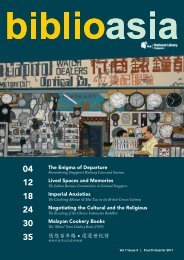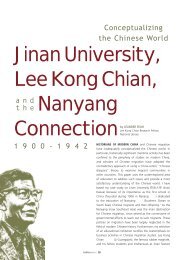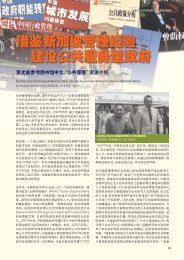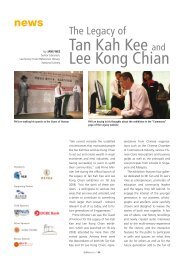éå°å¹³ä¸ æ°å å¡ç»éª - National Library Singapore
éå°å¹³ä¸ æ°å å¡ç»éª - National Library Singapore
éå°å¹³ä¸ æ°å å¡ç»éª - National Library Singapore
You also want an ePaper? Increase the reach of your titles
YUMPU automatically turns print PDFs into web optimized ePapers that Google loves.
FEATURE<br />
Why Politicians Don't Stay?<br />
Making Sense of Critical Political<br />
Events in Post-war Asia<br />
by Tay Thiam Chye<br />
Lee Kong Chian Research Fellow<br />
<strong>National</strong> <strong>Library</strong><br />
Critical political events are high-impact events that will change<br />
the political trajectory of a nation. Asia comprises nations with a<br />
range of political systems with different political dynamics. Some<br />
nations experience frequent changes of political party control of<br />
the government while other nations have the same political party<br />
controlling the government for decades. The latter refers mainly to<br />
dominant party systems whereby one dominant party dominates<br />
many aspects of a nation’s political life for decades.<br />
Recurrent news of factional crises or conflicts between key<br />
politicians within ruling political parties often sparks speculations<br />
of possible significant political changes. Nevertheless, these events<br />
have no great political impact unless a faction defects from the<br />
ruling party. This renegade faction can subsequently ally with the<br />
opposition parties to gain control of the government. Yet, such<br />
defections are rare events because factions face huge disincentives<br />
to defect from a ruling party. Factional leaders and members have<br />
to face huge political risks by giving up most of the prerogatives of<br />
ruling party members. This political risk is even greater in a dominant<br />
party system.<br />
Nevertheless, these rare events cannot be explained adequately by<br />
current theories using either a political party or an individual politician<br />
as the unit of analysis. This paper uses the faction as the unit of<br />
analysis and re-frames the analysis of a puzzling critical political event<br />
— factions defecting from a dominant political party — with a simple<br />
model. The framework posits that factional defection occurs only when<br />
the key factions are marginalised within the dominant party and expect<br />
to form the next government with the opposition parties. This model<br />
offers a framework to make sense of complex Asian politics.<br />
THE CONTEXT: THE EAST ASIAN ECONOMIC MIRACLE, STRONG<br />
GOVERNMENTS AND DOMINANT PARTIES<br />
Before the 1997 Asian Financial Crisis, the “East Asia Economic<br />
Miracle” story depicted strong governments providing leadership<br />
in national economic development. Such governments were usually<br />
dominant party systems with a political party dominating the<br />
political scene for decades. Japan’s Liberal Democratic Party (LDP)<br />
dominated Japanese politics for 38 years from 1955 to 1993. Its<br />
rule was associated with the rise of the Japanese economic miracle.<br />
Similarly, Taiwan’s <strong>National</strong>ist Party (Kuomintang, KMT) dominated<br />
the political scene from 1949 to 2000 and its rule was associated with<br />
rapid Taiwanese economic development. Together with South Korea,<br />
Hong Kong and <strong>Singapore</strong>, Taiwan was known as one of the “Four<br />
Asian Tigers”. In Southeast Asia, Malaysia’s United Malays <strong>National</strong><br />
Organisation (UMNO) has also been associated with Malaysia’s rapid<br />
growth as one of the “Emerging Tigers” with Indonesia and Thailand.<br />
The trend of having dominant party systems is not unique to Asia. The<br />
Christian Democratic Party dominated<br />
Italy’s politics for more than four<br />
decades (1948-92) while the Partido<br />
Revolucionario Institucional (PRI)<br />
dominated Mexico’s politics for more<br />
than seven decades (1920s-2000).<br />
Other current and past dominant<br />
parties include Ireland’s Fianna Fail,<br />
Sweden’s Social Democrats, South<br />
Africa’s <strong>National</strong> Congress (ANC), and<br />
Israel’s Labor Party.<br />
Despite dominating the political<br />
landscape of Asia for decades after the All rights reserved, Harwood<br />
Academic Publishers, c1999<br />
end of World War II, dominant parties<br />
have experienced different fates. On the one hand, most of these<br />
dominant parties have split and lost power. For instance, Indonesia’s<br />
Golongan Karya (Golkar) lost power in 1999, and Taiwan’s KMT lost<br />
control of the presidency to the Democratic Progressive Party’s (DPP)<br />
Chen Shui-bian in 2000. On the other hand, other dominant parties<br />
such as UMNO have remained in power. Significantly, among those<br />
parties that have lost power, some have regained power by relying<br />
on the decades of institutional advantage they have build up over the<br />
years. The Indian <strong>National</strong> Congress (INC) Party regained power in<br />
1980 after losing the 1977 elections and Japan’s LDP regained power<br />
in 1994, less than one year after losing it in 1993.<br />
THE PUZZLE AND WEAKNESSES OF CURRENT EXPLANATIONS<br />
It is an axiom that a dominant party has to implode before the rules of<br />
the political game in the dominant party system can be changed. The<br />
key challenge is to answer why a dominant party implodes or splits.<br />
This paper uses the faction as the unit of analysis to complement the<br />
weaknesses of current explanations.<br />
Current Explanation 1: Party Systems and Political Parties<br />
From the political party level point of view, it seems counter-intuitive<br />
for a dominant party to lose power because its dominance is<br />
sustained by a positive cycle of dominance. Dominant parties control<br />
nearly all aspects of the political system (legislative and executive)<br />
hence there is almost no viable alternative government for voters to<br />
choose from. The fragmented opposition parties are unlikely to have<br />
the institutional power and experience to rule as effectively as the<br />
dominant party. Consequently, most dominant party systems persist<br />
due more to the weak and divided opposition parties rather than the<br />
dominant party’s effective governance.<br />
One of the most important factors for dominant party longevity<br />
is the power asymmetry between the dominant party and opposition

















